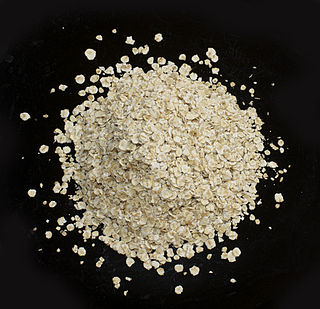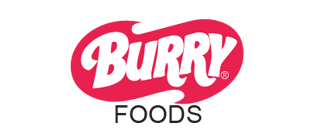
Breakfast cereal is a breakfast food made from processed cereal grains. It is traditionally eaten as part of breakfast, or a snack food, primarily in Western societies.

Cedar Rapids is the second-most populous city in Iowa, United States and is the county seat of Linn County. The city lies on both banks of the Cedar River, 20 miles (32 km) north of Iowa City and 100 miles (160 km) northeast of Des Moines, the state's capital and largest city. It is a part of the Cedar Rapids/Iowa City region of Eastern Iowa, which includes Linn, Benton, Cedar, Iowa, Jones, Johnson, and Washington counties.

Oatmeal is a preparation of oats that have been de-husked, steamed, and flattened, or a coarse flour of hulled oat grains (groats) that have either been milled (ground), rolled, or steel-cut. Ground oats are also called white oats. Steel-cut oats are known as coarse oatmeal, Irish oatmeal, or pinhead oats. Rolled oats were traditionally thick old-fashioned oats, but can be made thinner or smaller, and may be categorized as quick oatmeal or instant oatmeal depending on the cooking time required, which is determined by the size of the oats and the amount of precooking.

Shredded wheat is a breakfast cereal made from whole wheat formed into pillow-shaped biscuits. It is commonly available in three sizes: original, bite-sized and miniature. Both smaller sizes are available in a frosted variety, which has one side coated with sugar and usually gelatin. Some manufacturers have produced "filled" versions of the bite-size cereal containing a raisin at the center, or apricot, blueberry, raspberry, cherry, cranberry or golden syrup filling.

MOM Brands Company was an American producer of breakfast cereals, headquartered in Northfield, Minnesota. It marketed its products in at least 70% of the country's grocery stores, with estimated sales in 2012 of US$750 million. It operated four manufacturing plants, in Northfield, Minnesota; Tremonton, Utah; Asheboro, North Carolina; and St. Ansgar, Iowa. The company had distribution centers in Grove City, Ohio; Coppell, Texas; and Salt Lake City, Utah.
Mornflake is a British brand of oat and oat-based breakfast cereals launched in 1941 in Crewe, Cheshire.

Quaker Instant Oatmeal is a type of oatmeal made by the Quaker Oats Company, first launched in 1966. It is crafted from whole grain oats.

Ferdinand Schumacher (1822–1908), also known as The Oatmeal King, was an American entrepreneur and one of the founders of companies which merged to become the Quaker Oats Company.
Robert Stuart may refer to:

Quaker Square was a shopping and dining complex located in downtown Akron, Ohio which is now used by the University of Akron. Quaker Square was the original Quaker Oats factory; the complex consists of the former mill, factory, and silos. The buildings were bought in the early 1970s by developers who sought to create a unique, useful home for shops and restaurants. The buildings were bought by the University of Akron in 2007. The hotel has been converted to a residence hall. The retail space consisted of dozens of small shops and restaurants, and there were large areas of historic exhibits on such areas as the local Quaker industry and history of radio in Akron, while offices were on the floors above. Quaker Square was open to the general public until September 18, 2015. The hotel no longer accepts reservations as the former hotel rooms and the entire complex is operated exclusively for student and university use. However, ballrooms are still available for catered events and conferences.
Henry Parsons Crowell (1855–1944) was an American businessman and philanthropist. In 1881, Crowell purchased the Quaker Mill Company, and subsequently the brand name Quaker, and launched the first breakfast cereal advertising campaign in a magazine. He also purchased the bankrupt Quaker Oat Mill Company. In 1901, he founded the Quaker Oats Company.

Burry's is a food manufacturer, founded as Burry's Biscuit Corporation by George W. Burry in 1888 in Elizabeth, New Jersey. It became a division of the Quaker Oats Company in 1962. The company was one of the manufacturers of Girl Scout cookies from 1936 until 1989.
John Stuart (1877–1969) was the chief executive officer of the Quaker Oats Company from 1922 to 1953.
Robert Douglas Stuart was a United States businessman who served as United States Ambassador to Canada from 1953 to 1956.

Robert Douglas Stuart Jr. was the son of Quaker Oats Company co-founder R. Douglas Stuart, the founder of the America First Committee in 1940, the CEO of Quaker Oats from 1966 to 1981, and United States Ambassador to Norway from 1984 to 1989.

The Quaker Oats Company, known as Quaker, is an American food conglomerate based in Chicago, Illinois. As Quaker Mill Company, the company was founded in 1877 in Ravenna, Ohio. In 1881, Henry Crowell bought the company and launched a national advertising campaign for Quaker Oats.

The George B. Douglas House, which later became known as Turner Mortuary East, is owned today by The History Center, Linn County Historical Society. This historic building located in Cedar Rapids, Iowa, United States. The house was built for Douglas who was a partner in a cereal mill that became the Quaker Oats Company. David Turner bought the property in 1924 and converted the house into a funeral home. He was a patron of regionalist artist Grant Wood, and Turner leased the carriage house to him from 1924 to 1933. Wood used it as his residence, along with his mother, and as a studio. It was here at #5 Turner Alley that he painted two of his most famous paintings, American Gothic (1930) and Stone City (1930). Wood also worked as a decorator when he lived here and designed the interior of the main house when it was converted into a funeral home. His work included two stained glass windows that flank the main entrance. Several Wood paintings also hung in the funeral home.
The Cascade Cereal Company was a flour and cereal milling company in Tacoma, Washington. Originally named the Cascade Oatmeal Company, it was the first oat and cereal mill in the American west. Founded by Washington state pioneer John Wesley Berry in 1888, the company expanded quickly, opening additional mills and warehouses. By 1900, there were four more milling companies in Tacoma, and the Cascade Cereal Company was second in sales behind the Puget Sound Mills Company. The Cascade Cereal Company bid and won contracts to supply state schools and hospitals, and exported products to southeast Asia.

The Quaker Oats Plant is the largest cereal mill in the world, located in downtown Cedar Rapids, Iowa, United States. The tallest section of the complex rises 13 floors and 190 feet (58 m) in height. It is currently the 4th-tallest building in Cedar rapids.














